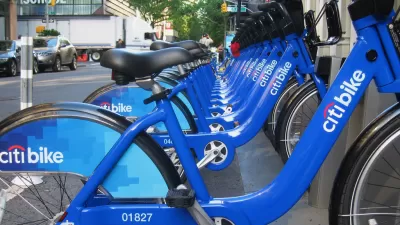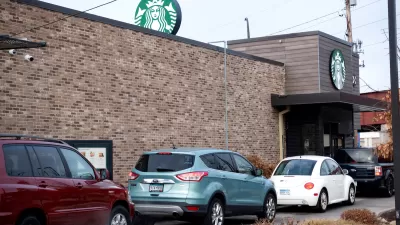Long Beach is leading California's bicycle revolution in many ways, perhaps most creatively in establishing bike-friendly shopping districts.
Author Mark Hertsgaard, explains why Minneapolis and Portland could learn a lesson from a part of the country usually associated with the automobile. Led by Mayor Bob Foster, who tries to bike 100 miles a week, and backed by state and federal grants, the city has installed 130 miles of bike trails, built protected bike lanes, created bike boulevards, and installed 1,200 new bike racks.
However, as Hertsgaard points out, "Perhaps most innovative has been the city's effort to establish bike-friendly shopping districts -- the first in the country, officials say -- engaging local merchants by showing them how, contrary to common belief, biking can actually bring more customers and vitality to shopping districts.
"The math is pretty simple," says April Economides, the principal of Green Octopus Consulting and the leader of the city's outreach to local businesses. "You can park 12 bikes in the amount of space it takes to park one car. And someone who shifts from owning a car to a bicycle tends to have more discretionary income, because, for a commuter, the typical cost of a bicycle is $300 a year, compared to $7,000 a year for a car."
FULL STORY: Cycles and cents: One city sets out to prove that bikes are good for business

Planetizen Federal Action Tracker
A weekly monitor of how Trump’s orders and actions are impacting planners and planning in America.

Maui's Vacation Rental Debate Turns Ugly
Verbal attacks, misinformation campaigns and fistfights plague a high-stakes debate to convert thousands of vacation rentals into long-term housing.

Restaurant Patios Were a Pandemic Win — Why Were They so Hard to Keep?
Social distancing requirements and changes in travel patterns prompted cities to pilot new uses for street and sidewalk space. Then it got complicated.

In California Battle of Housing vs. Environment, Housing Just Won
A new state law significantly limits the power of CEQA, an environmental review law that served as a powerful tool for blocking new development.

Boulder Eliminates Parking Minimums Citywide
Officials estimate the cost of building a single underground parking space at up to $100,000.

Orange County, Florida Adopts Largest US “Sprawl Repair” Code
The ‘Orange Code’ seeks to rectify decades of sprawl-inducing, car-oriented development.
Urban Design for Planners 1: Software Tools
This six-course series explores essential urban design concepts using open source software and equips planners with the tools they need to participate fully in the urban design process.
Planning for Universal Design
Learn the tools for implementing Universal Design in planning regulations.
Heyer Gruel & Associates PA
JM Goldson LLC
Custer County Colorado
City of Camden Redevelopment Agency
City of Astoria
Transportation Research & Education Center (TREC) at Portland State University
Jefferson Parish Government
Camden Redevelopment Agency
City of Claremont




























